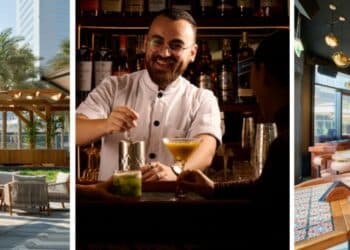From sharing a kitchen with some of the most famous chefs in the world and cooking for Princess Diana to nurturing budding culinary enthusiasts in the region the director of culinary arts at the Emirates Academy of Hospitality Management, Michael Kitts, speaks to Mahak Mannan about the pool of talent Dubai has on offer to the hospitality industry.

In a span of 12 weeks, students who have never set foot in a kitchen go from beginners to running a six course a la carte menu, under the guidance of Michael Kitts, Director of Culinary Arts at the Emirates Academy of Hospitality Management, and while there are always a few lost souls in the beginning, the young talent on offer in Dubai always surprises.
“We literally take them from as green as grass, it is a challenge but right from the onset we tell them, you get what you put in. Some like it and get really involved and there will be a few who absolutely detest it but that’s the way it is,” Kitts says.
As a student himself, Kitts wanted to study domestic science but back then, the subject only included metal work or wood work, which was “not for the guys”, according to the chef.
After school the culinary director got into Thanet Technical College (Now known as East Kent College) where he studied for his City & Guilds for two years followed by a year completing an advanced culinary diploma.
Since then, Kitts went on to work across several hotels in different areas within the culinary team including the Ritz Casino London, Intercontinental and Swallow Hotels with a five-year teaching stint at Thanet Technical College too.
Fast forward to 2001 where Kitts was approached to become a culinary instructor at a new hospitality institute in Dubai.
“At the time I said let’s give this a shot. I have competed all over the world but never experienced the Middle East so I was up for the challenge,” Kitts says.
“I was here six months pre-opening the Emirates Academy of Hospitality Management and am the last man standing from the original team. The school has gone from strength to strength over the years and here I am 18 years later doing the same.”
In its first year, the hospitality institution had 15 students and 17 faculties and today the institute boasts close to 300 students.
THE INDUSTRY
Due to the pace at which competition is growing in the food and beverage market, you have to make yourself stand out to break into the industry, says Kitts.
“I think the current climb in the market with restaurants and hotels makes it very tough for anyone in the industry as you’ve really got to go that extra mile to make yourself stand out in the crowd, a lot of it is getting flat now and I think the general public are leaning more towards value for money, which is why the right knowledge is of prime importance,” he says.
“I spend a lot of time on product knowledge, it is very important for anybody entering the food and beverage industry to know what products they are working with, more so now than ever where diners are very interested in what is going into their bodies.
“Where we source things from form a big part of what I do. Once they finish their courses, they do their internships and come back to do their electives. There are two main electives we do on our side in food and beverage which are food media, that includes the restaurant project, and the other ones is gastronomy,” Kitts explains.
The most important thing in running an institute like the Emirates Academy of Hospitality Management is keeping up with the change in trends.
“When you run an institute like this, you really got to keep up with what’s going on, you have to keep up with current trends, new innovations, channels and techniques to give the best insight to your students,” he says.
“It is a tough industry and it does not matter where you start, the first five years will always be a slog.”
The restaurant project is one such addition the Institute has introduced to keep up with the trends in the food and beverage industry.
“Marketing is paramount in the restaurant project. They have to come up with their own concept, market it, design it and put all of those things into reality when they test run the concept in our own dining outlet,” Kitts says.
“Some of the concepts they come up with could actually become their business plan once they graduate. If someone has an idea and they lobby it well amongst their group, test run the concept here and manage to get the buy-in, this puts them in a good place to actually implement it.”

THE CHALLENGES
Young talent today needs to be guided on how to make the right moves, according to Kitts.
“There are a lot of people who do not want to start from scratch, they want to be super stars from the beginning and it does not work like that, there is always a bit of a struggle,” he says.
“Years ago you stayed in a job a minimum of two years at least and people knew after that you either need to promote the employee or he is going to leave, it was a given but now you have people who are in a job six months and someone offers them AED 200 extra and a better designation and they are gone.
“Establishments also need to invest in their people now, in order to keep them. It is a tough industry, and if you will not do it, someone else will,” he says.
Dubai used to be a hot spot for international talent to come in and work but that has reduced of late, according to the chef.
“Ten years back Dubai was attracting a lot of talent but that has slowed down a little bit. The world is looking at what’s happening across the globe and where the best opportunities are. The Dubai Expo 2020 is coming up and that might restart things, but the actual wow element has gone off,” he says.
“Amongst our students however, we encourage them to grow locally first, the Jumeirah Group comes in every year and swipes the top talent from the batch.
“We advise them to stay local for a couple of years as they will have Dubai on their CV which will help them pave their path into the rest of Asia. Once they have that experience as well a lot of doors can open in the European market,” Kitts adds.
However, even the UAE food and beverage market is heading in an experimental direction, the Director of Culinary Arts says.
“My biggest worry at the moment is that are there enough diners to fill all the seats in these restaurants that are opening up. There are areas in Dubai with a captive audience but when you start going further there a lot of nice places but getting customers in those areas can be a challenge,” he explains.
“Also, this trend about being a little different needs rebooting. We have some lovely restaurants here that stand out but it all boils down to consistency. You go one week with great food and everyone raves about it but the next week it tastes worlds apart, that is a big problem.”


































































